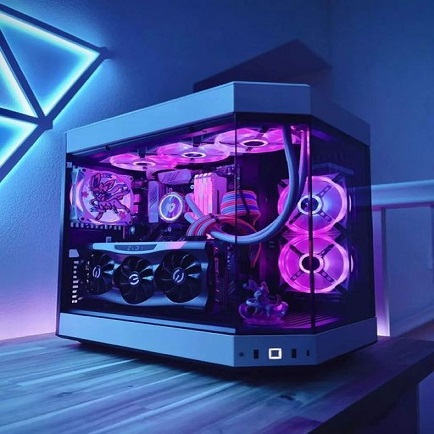Introduction
In the world of gaming, the right PC can make all the difference. Whether you’re diving into engaging RPGs, competing in fast-paced games, or exploring vast open worlds, having a powerful gaming PC enhances your experience. This guide will walk you through everything you need to know about gaming PCs, including key components, types of builds, and tips for choosing the best one for your needs.
Understanding Gaming PC Components
When it comes to gaming PCs, understanding the main components is essential:
- CPU (Central Processing Unit):
- The CPU is the brain of your PC. It processes instructions and manages tasks. For gaming, look for multi-core processors with high clock speeds. AMD Ryzen and Intel Core processors are popular choices.
- GPU (Graphics Processing Unit):
- The GPU is crucial for rendering graphics. A powerful graphics card ensures smooth gameplay and high-quality visuals. NVIDIA and AMD are the leading brands, with options ranging from entry-level to high-end.
- RAM (Random Access Memory):
- RAM affects how many applications can run simultaneously. For gaming, 16GB is typically the sweet spot, though 32GB is ideal for heavy multitasking or streaming.
- Storage:
- Fast storage can significantly reduce load times. Solid State Drives (SSDs) are faster than traditional Hard Disk Drives (HDDs). A combination of SSD for your operating system and frequently played games, along with an HDD for larger storage, is often recommended.
- Motherboard:
- The motherboard connects all components. Ensure it’s compatible with your CPU and has enough ports for future upgrades.
- Cooling System:
- Keeping your components cool is vital for performance. Choose between air cooling and liquid cooling based on your budget and preference.
- Power Supply Unit (PSU):
- The PSU provides power to all components. Ensure you have a reliable unit with enough wattage to support your system.
Types of Gaming PCs
- Pre-built Gaming PCs:
- Great for those who want a hassle-free experience. They come assembled and tested, often with warranties.
- Custom-built Gaming PCs:
- For enthusiasts who enjoy building their own rigs. This allows for customization based on personal preferences and budget.
- Mini PCs:
- Compact and portable, these PCs are perfect for gamers with limited space or those who travel often. While they may have lower performance than larger towers, many mini PCs can still handle modern games effectively.
Choosing the Right Gaming PC
When selecting a gaming PC, consider the following factors:
- Budget:
- Determine how much you’re willing to spend. High-end gaming PCs can exceed $2,000, while budget options can start around $700.
- Gaming Preferences:
- What types of games do you play? More demanding titles may require more powerful components.
- Future-Proofing:
- Consider future upgrades. A good motherboard and PSU will allow you to replace components as needed.
- Aesthetics:
- Gaming PCs come in various designs, from sleek and modern to RGB-lit beasts. Choose one that matches your style.
Maintenance Tips
To keep your gaming PC in top shape:
- Regular Cleaning:
- Dust can accumulate, affecting performance. Regularly clean fans and components to ensure optimal airflow.
- Update Drivers:
- Keeping your GPU and other drivers up to date can enhance performance and fix bugs.
- Monitor Temperatures:
- Use software to monitor CPU and GPU temperatures. If they run hot, consider upgrading your cooling solution.
- Backup Data:
- Regular backups prevent data loss. Use external drives or cloud services for safe storage.

